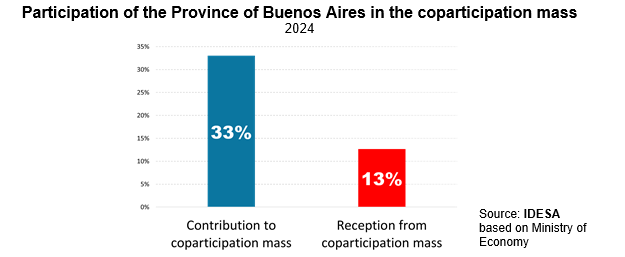Report Nº: 111102/03/2025
The conflict between the Nation and the Province of Buenos Aires makes explicit the worst of the coparticipation. It is very paradoxical that in the richest province of Argentina, security depends on national aid. Another evidence of the priority of a Tax and Functional Coordination Agreement to overcome the coparticipation.

Because of the dramatic facts of insecurity in the Conurbano, president Milei asked the governor of the Province of Buenos Aires, Kicillof, to let him intervene in the province so that the Nation could find a solution to the issue. The governor replied that the origin of the problem is that the Nation stopped sending him funds to fight insecurity. The heated debate revolves around two extreme views. For the president, the cause of the problem is the bad management of the Province of Buenos Aires, while the governor considers that the origin of the problem is that he does not have enough funds to fight crime.
The provinces receive two types of transfers from the central level. On the one hand, automatic transfers through coparticipation. This consists of putting all national taxes in a bag (coparticipation mass) and distributing them with fixed parameters and automatically between the Nation and the provinces. On the other hand, non-automatic or discretionary transfers that are resources of the Nation that it decides (or not) to send to the provinces. For example, Kicillof received from the previous national government a discretionary transfer for a so-called Fiscal Strengthening Fund that Milei suspended and is what Kicillof claims.
The question is why Buenos Aires needs discretionary transfers from the Nation to provide a reasonable security service. The co-participation helps to find the answer. According to data from the Ministry of Economy, it is observed that:
These data show that the Province of Buenos Aires receives only 1 out of every 3 pesos it contributes to the coparticipation. The counterpart is that the Nation appropriates a very high proportion of the coparticipation mass. This is one of the main explanations for the paradox that Argentina’s richest province depends on the Nation’s aid with discretionary transfers. Since historically the national government and the government of the Province of Buenos Aires were of the same political color, national aid flowed. With the change of political colors, the extreme dependence of the Province of Buenos Aires on national aid became apparent.
Coparticipation is perverse and an extreme example is the Province of Buenos Aires. It takes away resources and makes it chronically dependent on “aid” from the Nation. For the rulers of the Province of Buenos Aires, the priority is to ingratiate themselves with the Nation instead of improving public management. With these incentives, it is not surprising that the Province of Buenos Aires has levels of public management quality similar to those of the most backward provinces. The tragedy is that in the face of successive and resounding failures –not only in security but also in education, health, and infrastructure– the co-participation is not questioned as the origin of the problem. Responsibilities are simply diluted by blaming the Nation, which does not send enough “aid”.
The bad incentives generated by coparticipation are extensive to all provinces. Therefore, the priority is to establish a better regime. Instead of placing all national taxes in the bag of the coparticipation mass, VAT should be unified with provincial and municipal sales taxes in a single sales tax that should be assigned to the territory where the tax was generated. In this way, Buenos Aires could be financed with the taxes generated by its vibrant productive activity and its governor would have no excuses to justify himself for failures. For the provinces that lag behind and do not have so much productive activity, a convergence fund should be envisaged, which would automatically remit resources conditioned to investments for development.
The president is right that Buenos Aires is very poorly administered and the governor is also right that the resources received by the province are insufficient. The solution is to eliminate the pernicious coparticipation regime through a Tax and Functional Coordination Agreement between the Nation and the provinces (not necessarily all of them). So that each province will be the architect of its own destiny. It is a complex challenge, but not impossible.